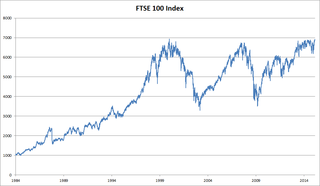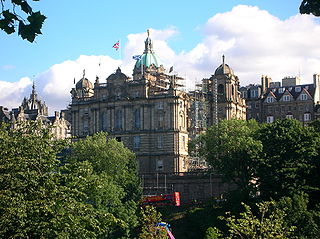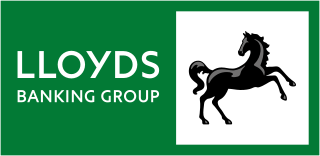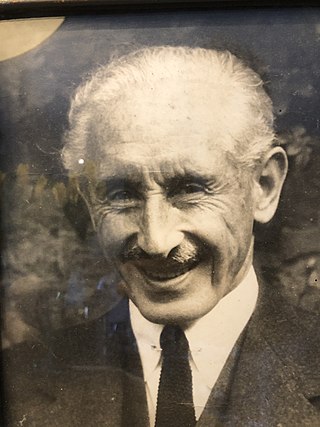
The Bank of Scotland plc is a commercial and clearing bank based in Scotland and is part of the Lloyds Banking Group, following the Bank of Scotland's implosion in 2008. The bank was established by the Parliament of Scotland in 1695 to develop Scotland's trade with other countries, and aimed to create a stable banking system in the Kingdom of Scotland.

The Financial Times Stock Exchange 100 Index, also called the FTSE 100 Index, FTSE 100, FTSE, or, informally, the "Footsie", is a share index of the 100 companies listed on the London Stock Exchange with the highest market capitalisation. The index is maintained by the FTSE Group, a subsidiary of the London Stock Exchange Group.

Lloyds Bank plc is a British retail and commercial bank with branches across England and Wales. It has traditionally been considered one of the "Big Four" clearing banks. Lloyds Bank is the largest retail bank in Britain, and has an extensive network of branches and ATMs in England and Wales and offers 24-hour telephone and online banking services. As of 2012 it had 16 million personal customers and small business accounts.

The Trustee Savings Bank (TSB) was a British financial institution. Trustee savings banks originated to accept savings deposits from those with moderate means. Their shares were not traded on the stock market but, unlike mutually held building societies, depositors had no voting rights; nor did they have the power to direct the financial and managerial goals of the organisation. Directors were appointed as trustees on a voluntary basis. The first trustee savings bank was established by Rev. Henry Duncan of Ruthwell in Dumfriesshire for his poorest parishioners in 1810, with its sole purpose being to serve the local people in the community. Between 1970 and 1985, the various trustee savings banks in the United Kingdom were amalgamated into a single institution named TSB Group plc, which was floated on the London Stock Exchange. In 1995, the TSB merged with Lloyds Bank to form Lloyds TSB, at that point the largest bank in the UK by market share and the second-largest by market capitalisation.

Marcus Samuel, 1st Viscount Bearsted,, known as Sir Marcus Samuel between 1898 and 1921 and subsequently as The Lord Bearsted until 1925, was a Lord Mayor of London and the founder of the Shell Transport and Trading Company, which was later restructured including a Holland-based company commonly referred to as Royal Dutch Shell.
Maarten Albert van den Bergh is a Dutch businessman.

The HBOS Group Reorganisation Act 2006 is a local Act of Parliament, passed by the Parliament of the United Kingdom in June 2006. The aim of the act was to provide HBOS plc, a banking and insurance group in the UK, the legal authority to reorganise its subsidiaries into a simplified structure. It came into effect on 17 September 2007.
Sir Peter Alexander Burt FRSE was a Scottish businessman, former Chief Executive and later Governor of the Bank of Scotland.

The Lloyds TSB Act 1998 is a private Act of the United Kingdom Parliament, to provide for the transfer to and vesting in Lloyds Bank plc of the undertakings of TSB Bank plc and Hill Samuel Bank Limited ; and for connected purposes.

Macquarie Group Limited is an Australian global financial services group. Headquartered and listed in Australia, Macquarie employs more than 17,000 staff in 33 markets, is the world's largest infrastructure asset manager and Australia's top ranked mergers and acquisitions adviser, with more than A$737 billion in assets under management.

HBOS plc was a banking and insurance company in the United Kingdom, a wholly owned subsidiary of the Lloyds Banking Group, having been taken over in January 2009. It was the holding company for Bank of Scotland plc, which operated the Bank of Scotland and Halifax brands in the UK, as well as HBOS Australia and HBOS Insurance & Investment Group Limited, the group's insurance division.

Lloyds Banking Group is a British financial institution formed through the acquisition of HBOS by Lloyds TSB in 2009. It is one of the UK's largest financial services organisations, with 30 million customers and 65,000 employees. Lloyds Bank was founded in 1765 but the wider Group's heritage extends over 320 years, dating back to the founding of the Bank of Scotland by the Parliament of Scotland in 1695.
Emile Erlanger & Co. was a French finance and investment company established by German-born, Parisian banker Baron Frédéric Émile d'Erlanger and was active during and after the period of Reconstruction following the American Civil War. d'Erlanger was married to Matilde Slidell, the daughter of Louisiana merchant, lawyer and politician John Slidell.

NBNK Investments plc was a UK-based financial investment company formed by Lord Levene and a consortium of senior business figures in 2010. The aim of the company was to build a new large UK retail bank primarily through the acquisition of other banks.
Cheltenham & Gloucester plc (C&G) was a mortgage and savings provider in the United Kingdom, a subsidiary of Lloyds Banking Group. C&G specialised in mortgages and savings products. Previously, C&G was a building society, the Cheltenham and Gloucester Building Society. Its headquarters were in Barnwood, Gloucester, Gloucestershire, England. C&G was closed to new mortgage and savings business on 9 September 2013.
Sir Robert Anthony "Bob" Clark DSC was a British naval officer and businessman. Clark attended King's College, Cambridge, before leaving at the age of 18 to join the Royal Naval Volunteer Reserve during the Second World War. Discovered to be colour blind he was relegated to non-seagoing posts, a prospect he found unappealing. He volunteered for service with the Special Operations Executive and saw active service in Italy, first on amphibious missions and later as a liaison officer with partisans in the Piedmont Mountains. Clark was captured by the Germans, and was later awarded the Distinguished Service Cross for his gallantry.

TSB Bank plc is a retail and commercial bank in the United Kingdom and a subsidiary of Sabadell Group.
Lloyds Bank International is a wholly owned subsidiary of Lloyds Bank Corporate Markets in the United Kingdom, which is in turn part of Lloyds Banking Group, one of the largest banking groups in Europe.

Baron Leo Frédéric Alfred d'Erlanger, also Leo Friedrich Alfred Baron von Erlanger was an English merchant banker and air transport promoter, Chairman of the Erlanger Bank and of the Channel Tunnel Company.












